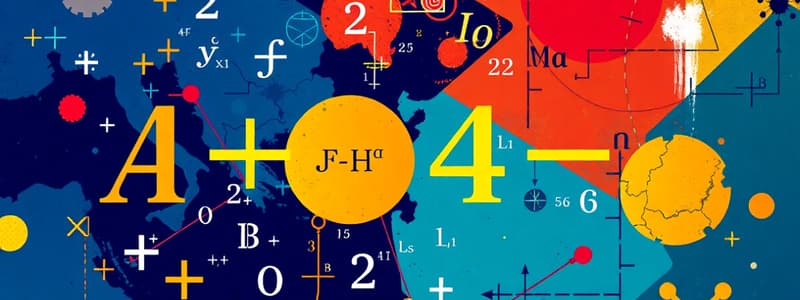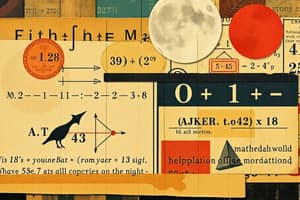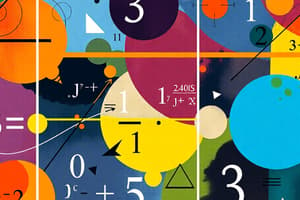Podcast
Questions and Answers
What is the primary focus of arithmetic?
What is the primary focus of arithmetic?
- Studying shapes and their properties
- Solving equations with variables
- Calculating rates of change and accumulation
- Basic operations like addition and subtraction (correct)
Which property of numbers indicates that the order of operations does not affect the result in addition?
Which property of numbers indicates that the order of operations does not affect the result in addition?
- Distributivity
- Commutativity (correct)
- Associativity
- Identity
What is a key concept studied in algebra?
What is a key concept studied in algebra?
- Graphs of functions (correct)
- Area and perimeter of shapes
- Random sampling methods
- Rates of continuous change
Which of the following geometric figures is a three-dimensional object?
Which of the following geometric figures is a three-dimensional object?
What does differential calculus primarily study?
What does differential calculus primarily study?
Which measure is NOT part of descriptive statistics?
Which measure is NOT part of descriptive statistics?
What concept links differential and integral calculus?
What concept links differential and integral calculus?
Which branch of mathematics focuses on the study of shapes and spatial relationships?
Which branch of mathematics focuses on the study of shapes and spatial relationships?
Flashcards
What is mathematics?
What is mathematics?
A formal system of logic and reasoning used to quantify, model, and understand patterns in the world.
Arithmetic
Arithmetic
The study of basic operations (addition, subtraction, multiplication, division) involving numbers.
Algebra
Algebra
Uses variables to represent unknown values and involves solving equations.
Geometry
Geometry
Signup and view all the flashcards
Calculus
Calculus
Signup and view all the flashcards
Statistics
Statistics
Signup and view all the flashcards
Place value
Place value
Signup and view all the flashcards
Solving equations
Solving equations
Signup and view all the flashcards
Study Notes
Fundamental Concepts
- Mathematics is a formal system of logic and reasoning used to quantify, model, and understand patterns in the world.
- It's a foundational subject with applications in various fields, including science, engineering, finance, and computer science.
- Key branches include arithmetic, algebra, geometry, calculus, and statistics.
Arithmetic
- Focuses on basic operations: addition, subtraction, multiplication, and division.
- Includes the study of numbers, number systems (like whole numbers, integers, rational numbers, irrational numbers, and real numbers).
- Properties of numbers, such as commutativity, associativity, and distributivity, are important in arithmetic.
- Fundamental concepts like place value and rounding are critical in arithmetic operations.
Algebra
- Involves using variables to represent unknown quantities or values.
- Emphasizes solving equations and manipulating expressions to find solutions.
- Key concepts include solving linear equations, quadratic equations, and systems of equations.
- Manipulating algebraic expressions using the rules of arithmetic and properties of equality is essential.
- Functions and their graphs form a significant aspect of this branch.
Geometry
- Deals with shapes, sizes, and spatial relationships.
- Includes the study of points, lines, angles, planes, polygons, and solids.
- Concepts like area, perimeter, volume, and surface area are fundamental to this branch.
- Different types of geometric figures and their properties are studied, such as triangles, quadrilaterals, circles, and three-dimensional objects (like cubes and spheres).
- Transformations like rotations, reflections, and translations of geometric figures are key principles.
Calculus
- A branch dealing with continuous change.
- Comprises differential calculus (study of rates of change) and integral calculus (study of accumulation).
- Fundamental theorems of calculus link these two branches.
- Concepts such as derivatives, integrals, limits, and infinite series are important components.
- Applications span numerous scientific disciplines from physics to economics.
Statistics
- Deals with collecting, organizing, analyzing, interpreting, and presenting numerical data.
- Descriptive statistics focus on summarizing and describing data using measures of central tendency (mean, median, mode) and dispersion (variance, standard deviation).
- Inferential statistics uses data to make inferences and predictions about a larger population.
- Statistical concepts include probability, distributions (normal distribution, binomial distribution), hypothesis testing, and correlation.
- Essential for making data-driven decisions across several areas.
Studying That Suits You
Use AI to generate personalized quizzes and flashcards to suit your learning preferences.





